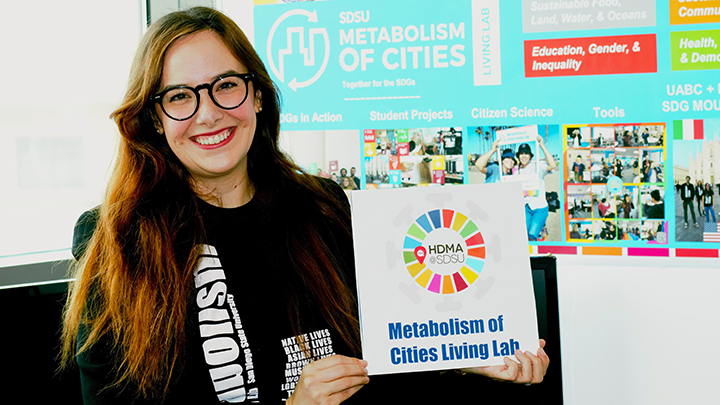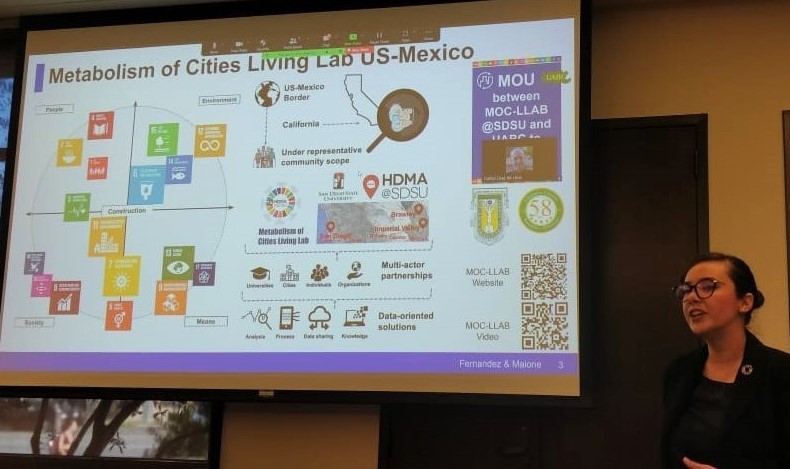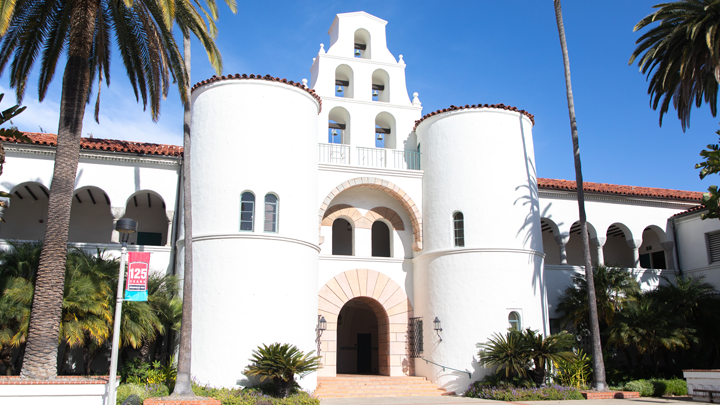SDSU lab dives into big data to localize UN Sustainable Development Goals
At Metabolism of Cities Living Lab, researchers build awareness of climate change and give a voice to vulnerable populations along the U.S.-Mexico border and globally.

To improve safety for children walking or riding bicycles to school, San Diego State University researchers combed through a decade of accident data in Chula Vista, pinpointing danger zones and creating a virtual reality video game to teach pedestrian safety.
The Safe-D project, a 2022 partnership with Virginia Tech and Texas A&M, exemplifies the work of SDSU’s Metabolism of Cities Living Lab, which seeks to localize the 17 United Nations Sustainable Development Goals using a data-driven approach and embracing the UN concept of “Leave No One Behind.”
This Think Globally, Act Locally initiative is led by Gabriela Fernandez, SDSU graduate student advisor in the Big Data Analytics master’s program at the College of Arts and Letters and SDSU Global Campus.
Fernandez, an adjunct faculty member, is founding director of the SDSU Metabolism of Cities Living Lab, hosted by Center for Human Dynamics in the Mobile Age in SDSU’s Geography department.
Metabolism of Cities Living Lab frames urban areas as living organisms that consume energy, water and other resources. Fernandez incorporated the UN sustainability benchmarks to build awareness of climate change and give a voice to vulnerable populations through data visualizations, campaigns, and events.
The Chula Vista project localizes three of the UN Sustainable Goals: Good Health & Well Being; Industry, Innovation and Infrastructure; and Sustainable Cities and Communities.
Nasser Mohieddin, an SDSU graduate who was part of the Metabolism of Cities Living Lab while a student, worked to raise awareness of the growing Middle East/North Africa (MENA) immigrant population in El Cajon.
These immigrants were mostly invisible to government officials, said Mohieddin. There was no MENA category on the U.S. Census or on many other official documents. Working with a non-profit, Mohieddin conducted a survey to generate data and better understand this group.
“Most of the Middle Eastern population in the city are refugees,” he said. “From my research, there is an insufficiency in these programs at this point to help these refugees settle in, assimilate to the new environment, and find jobs.”
Through Mohieddin’s efforts, the San Diego County Board of Supervisors took steps in May to recognize the region’s Middle Eastern population on county documents, bringing increased visibility and resources to these communities, said Fernandez.
“What we do in the Metabolism of Cities Living Lab is we advocate for all those left behind,” said Fernandez. “You can’t localize the Sustainable Development Goals if you don’t consider everyone.”
Mohieddin’s project localized UN Sustainable Development Goals including: No Poverty; Decent Work and Economic Growth; Reduce Inequalities; and Sustainable Cities and Communities.
 Open the image full screen.
Open the image full screen.
Students in Fernandez’s lab have probed topics such as homelessness, ocean pollution, health care access, and social-media misinformation, among others at the intersection of big data and social advocacy.
For SDSU, this work aligns with the university’s Climate Action Plan and its overall ongoing Strategic Plan.
Fernanda Carrillo, a graduate student in the Big Data Analytics master’s program, researched health challenges faced by women along the U.S.-Mexico border as part of Metabolism of Cities Living Lab’s Chiara Project, a collaboration between SDSU, Universidad Autónoma de Baja California (UABC) in Mexico, a non-governmental organization in Venezuela, and Universidad Simón Bolívar in Colombia.
Carrillo developed a Chiara Project dashboard to spotlight shortages of healthcare facilities and infrastructure in some communities in the San Diego region. She also worked to pinpoint areas where poverty and language barriers limited health care access for women.
“The dashboard provides actionable insights to address these disparities by identifying where resources are most needed,” said Carrillo. “It also emphasizes the need for targeted interventions, such as increasing healthcare access in underserved areas, developing culturally sensitive outreach programs, and promoting economic empowerment for women.”
Carrillo’s research ties to UN Sustainable Development Goals on Improving Health and Well-Being; Gender Equality; and Reducing Inequality.
Many Metabolism of Cities projects rely on open-source data. But students also work with nonprofits to conduct surveys, as well as tap other data sources to gain additional insights.
“Data is fine at the national level, but when you look at the local level, where real policy making actually impacts people in their everyday lives, that data is sometimes missing in some areas,” said Fernandez. “As researchers, we have to be creative about how we can get that data.”
In October, Stephanie Meza, a graduate student in SDSU’s Global Campus online Big Data Analytics master’s program, presented her research with Fernandez in Athens, Greece on human trafficking along the U.S. southern border at the One Health International Conference. The conference is organized by the Metabolism of Cities Living Lab and global partners.
“By utilizing a data-driven approach, including the creation of interactive dashboards and visualizations, we identify hotspots for trafficking and related mental health issues,” said Meza in an interview with SDSU Global Campus. “Our goal is to inform and empower community leaders, policymakers and health care providers with actionable insights to combat these challenges effectively.”




